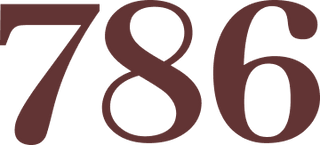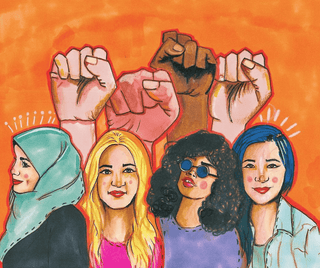International Women's day is upon us once again and there's a lot to talk about. This past year has been wrought with challenges when it comes to women's rights. Nothing new there, of course. We've seen brave women come forward and claim the #MeToo movement as a catalyst for systemic change in the workplace and private spheres. We've been witness to the unapologetic, tenacious, loud, and proud, #BlackLivesMatter activists and geniuses,
Patrisse Cullors, Alicia Garza, and Opal Tometti, who have captivated an entire nation with their unrelenting work on the problem of police corruption and inherent racism in America. Since 2013, these women have catapulted what is now one of the most invaluable tools in our generations' organizing efforts; Black Lives Matter was the first movement in history to use the internet and social media as an organizing tool. "Mediated mobilization", set the stage for other movements such as #MeToo, #NeverAgain, and #TimesUp to be as powerful as they were.
We have seen the confident, poised, un-relenting, and strong young woman that is
Ahed Tamimi become a powerful icon for the Palestinian resistance movement. This young woman's unwavering dedication to her dream of a free homeland has inspired millions all over the globe. We have witnessed a stunning feat for woman of colour, immigrant women, African American women, indigenous women, and Muslim women all over America through the midterm election's long awaited shift in representation. We have seen women as the face of mainstream fashion campaigns like GAP, Max Mara, and Nike.
Halima Aden, a Muslim American woman of colour, continues to own the runway without compromising her faith and morals.
Ibtihaj Muhammad continues to break down stereotypes.
Linda Sarsour continues to champion women's rights whilst unapologetically fighting for the rights of any marginalized minority in the United States.
Dena Takruri is still as tenacious, unapologetic, and determined as ever to always seek the truth in a world that profits from the mass delivery of miss information and in particular, Islamophobia.

Despite these feats and despite the strides we have made in fighting for inclusion and representation in our lives, there is still a long way to go. Specifically though, what does that look like for Muslim women? How far have we come and where are we headed? Misogyny is still rampant and bleeding our women dry under the guise of religion. Culture and faith have become warped into one undistinguishable boulder that women are constantly trying to carry by themselves. In many Muslim countries, women have been denied basic human rights like education, access to adequate sanitary tools, access to mental health facilities, and safe spaces to come together and foster the bonds of sisterhood. Islam granted women rights eons and eons before the West decided women were human enough to be allowed to vote. Women have rights in Islam yet we see women constantly taken advantage of in certain communities. Domestic violence does not discriminate and the Muslim community is not immune. Mental health is not gendered, women are often the ones who suffer in silence for fear of being called "dramatic" or "attention seeking." Honour killings are becoming more and more frequent, a woman's right to education is not a priority in a large majority of poverty stricken nations. Divorce and mental health are still heavily tabooed topics.
[embed]https://www.instagram.com/p/BuwHDPvnnHQ/[/embed]
Where does that leave us? Should we be dishevelled and lose hope that the state of Women has been bombarded with generational sexist ideologies that have become so much the norm that they are permanent? No. Of course not. It's difficult to see how things can possible improve but we are headed in the right direction. Women all over the world, especially in Muslim countries, are mobilizing to finally write their own narratives. Organized marches and protests are gaining momentum. Movements like #MeToo have made their way to the shores of Pakistan via
Meesha Shafi's powerful coming forward and catalyzing other Pakistani women to do the same.
[embed]https://www.instagram.com/p/BuvqLK5nxzk/[/embed]
Non profit organizations like
Naseeha Helpline,
Nisa Homes, and
NCCM, are paving the way to bring access to much needed mental health resources, human rights, and civil liberties, to Muslim women across North America. Social media influencers like
Irene Khan, and
Mejgan, encourage Muslim women to stand up for themselves, take themselves out of unhealthy relationships, and never forget to take care of themselves. These women are giving Muslim women a voice and are openly discussing taboo topics online with their followers to break down stigmas and give women the courage to stand up for their rights. Mental health advocates and therapists like
Chereen continue to provide support to hurting women online through intimate Q&A sessions, in depth online articles that delve into heavy often under discussed topics, and one on one counselling. These women, are paving the way for the change women desire and need.
As women, it's our responsibility to take a stance on topics that we want to reclaim. Starting at the micro level within our own homes. Speak up when you see injustice. Find support in other women. Support the women around you. Encourage dialogue when it comes to uncomfortable topics. Remain steadfast in your vision. Follow your heart and never compromise your faith, or identity.

[main image:
Mailha Art]
 Despite these feats and despite the strides we have made in fighting for inclusion and representation in our lives, there is still a long way to go. Specifically though, what does that look like for Muslim women? How far have we come and where are we headed? Misogyny is still rampant and bleeding our women dry under the guise of religion. Culture and faith have become warped into one undistinguishable boulder that women are constantly trying to carry by themselves. In many Muslim countries, women have been denied basic human rights like education, access to adequate sanitary tools, access to mental health facilities, and safe spaces to come together and foster the bonds of sisterhood. Islam granted women rights eons and eons before the West decided women were human enough to be allowed to vote. Women have rights in Islam yet we see women constantly taken advantage of in certain communities. Domestic violence does not discriminate and the Muslim community is not immune. Mental health is not gendered, women are often the ones who suffer in silence for fear of being called "dramatic" or "attention seeking." Honour killings are becoming more and more frequent, a woman's right to education is not a priority in a large majority of poverty stricken nations. Divorce and mental health are still heavily tabooed topics.
[embed]https://www.instagram.com/p/BuwHDPvnnHQ/[/embed]
Where does that leave us? Should we be dishevelled and lose hope that the state of Women has been bombarded with generational sexist ideologies that have become so much the norm that they are permanent? No. Of course not. It's difficult to see how things can possible improve but we are headed in the right direction. Women all over the world, especially in Muslim countries, are mobilizing to finally write their own narratives. Organized marches and protests are gaining momentum. Movements like #MeToo have made their way to the shores of Pakistan via Meesha Shafi's powerful coming forward and catalyzing other Pakistani women to do the same.
[embed]https://www.instagram.com/p/BuvqLK5nxzk/[/embed]
Non profit organizations like Naseeha Helpline, Nisa Homes, and NCCM, are paving the way to bring access to much needed mental health resources, human rights, and civil liberties, to Muslim women across North America. Social media influencers like Irene Khan, and Mejgan, encourage Muslim women to stand up for themselves, take themselves out of unhealthy relationships, and never forget to take care of themselves. These women are giving Muslim women a voice and are openly discussing taboo topics online with their followers to break down stigmas and give women the courage to stand up for their rights. Mental health advocates and therapists like Chereen continue to provide support to hurting women online through intimate Q&A sessions, in depth online articles that delve into heavy often under discussed topics, and one on one counselling. These women, are paving the way for the change women desire and need.
As women, it's our responsibility to take a stance on topics that we want to reclaim. Starting at the micro level within our own homes. Speak up when you see injustice. Find support in other women. Support the women around you. Encourage dialogue when it comes to uncomfortable topics. Remain steadfast in your vision. Follow your heart and never compromise your faith, or identity.
Despite these feats and despite the strides we have made in fighting for inclusion and representation in our lives, there is still a long way to go. Specifically though, what does that look like for Muslim women? How far have we come and where are we headed? Misogyny is still rampant and bleeding our women dry under the guise of religion. Culture and faith have become warped into one undistinguishable boulder that women are constantly trying to carry by themselves. In many Muslim countries, women have been denied basic human rights like education, access to adequate sanitary tools, access to mental health facilities, and safe spaces to come together and foster the bonds of sisterhood. Islam granted women rights eons and eons before the West decided women were human enough to be allowed to vote. Women have rights in Islam yet we see women constantly taken advantage of in certain communities. Domestic violence does not discriminate and the Muslim community is not immune. Mental health is not gendered, women are often the ones who suffer in silence for fear of being called "dramatic" or "attention seeking." Honour killings are becoming more and more frequent, a woman's right to education is not a priority in a large majority of poverty stricken nations. Divorce and mental health are still heavily tabooed topics.
[embed]https://www.instagram.com/p/BuwHDPvnnHQ/[/embed]
Where does that leave us? Should we be dishevelled and lose hope that the state of Women has been bombarded with generational sexist ideologies that have become so much the norm that they are permanent? No. Of course not. It's difficult to see how things can possible improve but we are headed in the right direction. Women all over the world, especially in Muslim countries, are mobilizing to finally write their own narratives. Organized marches and protests are gaining momentum. Movements like #MeToo have made their way to the shores of Pakistan via Meesha Shafi's powerful coming forward and catalyzing other Pakistani women to do the same.
[embed]https://www.instagram.com/p/BuvqLK5nxzk/[/embed]
Non profit organizations like Naseeha Helpline, Nisa Homes, and NCCM, are paving the way to bring access to much needed mental health resources, human rights, and civil liberties, to Muslim women across North America. Social media influencers like Irene Khan, and Mejgan, encourage Muslim women to stand up for themselves, take themselves out of unhealthy relationships, and never forget to take care of themselves. These women are giving Muslim women a voice and are openly discussing taboo topics online with their followers to break down stigmas and give women the courage to stand up for their rights. Mental health advocates and therapists like Chereen continue to provide support to hurting women online through intimate Q&A sessions, in depth online articles that delve into heavy often under discussed topics, and one on one counselling. These women, are paving the way for the change women desire and need.
As women, it's our responsibility to take a stance on topics that we want to reclaim. Starting at the micro level within our own homes. Speak up when you see injustice. Find support in other women. Support the women around you. Encourage dialogue when it comes to uncomfortable topics. Remain steadfast in your vision. Follow your heart and never compromise your faith, or identity.
 [main image: Mailha Art]
[main image: Mailha Art]


